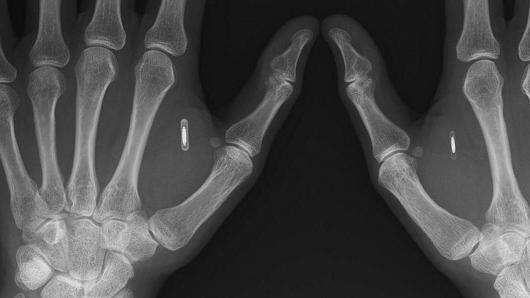Cyber Security: Where are we now and where are we headed?
I recently had an extended conversation with John Jorgensen, founder and CEO of the Sylint Group, and USAF Brigadier General (Ret.) Charly Shugg, Sylint’s Chief Operations Officer, on where we are on cyber security and where we are headed. Both John and Charly understand that technology is ubiquitous. It is present, appearing and found everywhere. As technology expands so does the possibility of those with the necessary skills to use it for both good and evil. The Sylint Group is focused on combating the evil – the cyber war being conducted at every level from the individual to the nation state every moment of every day.
The more we tune in, turn on and hook in to technology the greater the threat to individual privacy and freedom.
Mr. Jorgensen believes the greatest future threat is from “chipping” but more about that later.
What is the current threat?
What most individuals think about when you say cyber security is protecting their personal information (e.g. credit cards, medical records, telephone and email conversations). For corporations it is about protecting their data, corporate processes and networks. For nation states, like the U.S., it is about protecting national assets such as the electrical grid, nuclear power plants, government websites and government secrets. Each sector has its unique needs but are these needs to provide cyber security being met? According to Mr. Jorgensen they are not. Mr. Jorgensen in his column “A New Age – The Cyber Information Age” wrote:
We are connected to each other electronically through communications systems that we don’t understand and to people we don’t know personally, and maybe don’t know that they are connected to us. Our lives bleed out through on-line personal accounts and everyone knows our foibles and sins. Our hard earned money is stolen from our bank accounts by somebody in a mid-eastern country, which we didn’t know existed. And all of this is accomplished using 1’s and 0’s in a nanosecond of time from thousands of miles away.
I notice that the American Enterprise Institute (AEI) is held a conference titled “Road Ahead to Cybersecurity”. I don’t think that there is a “road ahead” for cyber security. There isn’t a road at all! The whole playing field has changed and there are no defined roads in or out.
I firmly believe that we are stuck in a quagmire alongside that “road” to the playing field and it dead ended at the entry to a new age called “the Cyber Information Age”.
What are the future threats?
Restorative and enhancement technologies, biohackers, cyborgs, grinders and sub-dermal technology (chipping). Restorative technologies include devices used to help individuals medically. They are devices, that include a computer chip, used to restore the lives of individuals to normal or near normal. Restorative technologies include devices such as: heart pace makers, insulin pumps and prosthetic devices.
Enhancement devices are those which the individual implants into their bodies outside of the medically approved arena. Individuals can for just $39 buy a glass-encased embeddable chip that works with some Android smartphones. A full DIY cyborg kit, including a sterilized injector and gauze pads, runs about $100. Amal Graafstra, a cyborg who creates and sells biohacking devices, said, “Some people see the body as a spiritual vessel not to be tampered with. And some people understand their body is their own, treating it like a sport utility vehicle. I see [biohacking] as, I got fancy new fog lights on my SUV. “
Some of these enhancement devices are being designed to be used with computer games. The idea is to give the gamer a more realistic experience by using sub-dermal technology to provide pleasure and pain as the game is played. Mr. Jorgensen states that the gaming industry is “spending $300 million annually” to provide sub-dermal gaming chips, effectively turning gamers into cyborgs.
If a gaming chip is implanted in an individual and it can impact that person emotionally or physiologically, then someone (biohackers) could access the chip and use it to control the individual. Mr. Jorgensen calls this phenomenon “chipping.” Mr. Jorgensen notes that the U.S. military used to use games to train our soldier but dropped the program. The reason was that games are all about the individual and not the team. The gamer games to win, regardless of the impact of those around him or her.
How will this impact society?
Jim Brandon in his column “Is there a microchip implant in your future?” wrote:
Like any tech advancement, there are downsides. Concerns about the wrong people accessing personal information and tracking you via the chips have swirled since the FDA approved the first implantable microchip in 2004.
Naam and Pang both cited potential abuses, from hacking into the infrastructure and stealing your identity to invading your privacy and knowing your driving habits. There are questions about how long a felon would have to use a tracking implant. And, an implant, which has to be small and not use battery power — might not be as secure as a heavily encrypted smartphone.
Troy Dunn, who attempts to locate missing persons on his TNT show “APB with Troy Dunn,” said a chip implant would make his job easier, but he is strongly against the practice for most people. “I only support GPS chip monitoring for convicted felons while in prison and on parole; for sex offenders forever; and for children if parents opt in,” he says. “I am adamantly against the chipping of anyone else.”
Using chip implants to locate abducted children could actually have the opposite effect. Pang says a microchip would make a missing person easier to rescue, but “Kidnappers want ransoms, not dead bodies. The most dangerous time for victims is during rescue attempts or when the kidnappers think the police are closing in.”
And beyond the obvious privacy issues, there’s something strange about injecting a chip in your body, Lipoff says. Yet pacemakers and other embedded devices are commonly used today. “People might find it a bit unsavory, but if it is not used to track you, and apart from the privacy issues, there are many interesting applications,” he says.
What happens if you, your child or grandchild decide to implant a chip in their body. What would you say, think, do?
RELATED ARTICLES:
Cybersecurity warnings: Will we ignore all of this?
‘Smart Cities’ Will Know Everything About You
Hack of security clearance system affected 21.5 million people, federal authorities say
Here Comes the Birth Control “Implant Your Daughter” Crusade
German ‘Romeo’ drugs girlfriend to keep playing video games for hours on end
The OPM breach: Can the U.S. respond to the “Pearl Harbor” of cyber-attacks?
Schools Implant IUDs in Girls as Young as 6th Grade Without Their Parents Knowing
Strategic Risks of Ambiguity in Cyberspace
Cliff Davis: Startling confession peels back layers of a murder suspect’s mind
RELATED VIDEO: Video courtesy of Grinders: David Forbes and his column “Tomorrow’s Cyberpunks are here Today” [NSFW]




Leave a Reply
Want to join the discussion?Feel free to contribute!